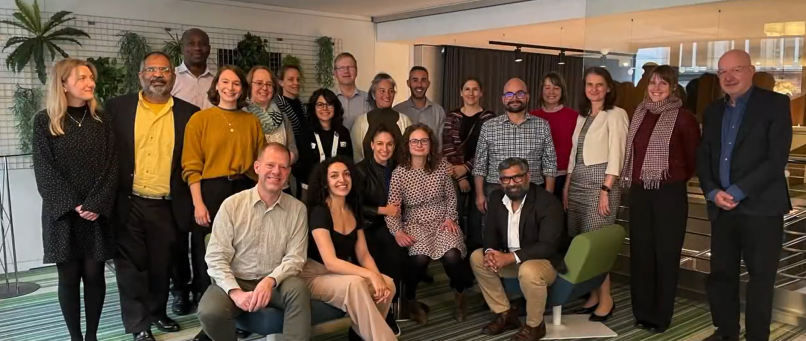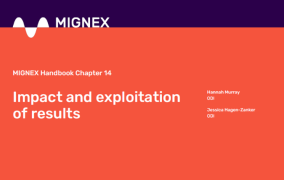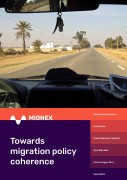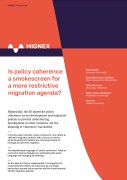News
We meet again: Teamwork, challenging questions, policy impacts
Reflections on the MIGNEX Consortium Meeting 2023.
The fifth MIGNEX Consortium Meeting took place in Brussels from 2-3 November. It gathered 21 members and three End User Board members.
We reflected on how far we’ve come since initial project planning and preparation in 2018, carrying out data collection during the Covid-19 pandemic, to the current stage of analysis and dissemination - with the aim of creating new knowledge on migration, development, and policy.
State of the project
Since its inception in 2018, the MIGNEX project has undergone many transformations, particularly in the face of the many challenges of the global Covid-19 pandemic.
Ahead of project completion in 2024, we are currently focusing on the production of knowledge and impact. We have published 3 Policy Briefs, 26 Case Study Briefs, 23 Background Papers and 13 Handbook Chapters.
In 2024, our flagship reports will share key insights on: the causes of migration, the development impacts of migration; and the extent of coherence in migration-relevant European policies. Our policy insights will be shared in a series of Policy Briefs on these topics. To stay up to date with our research: sign up to our newsletter and regularly visit our publication page.
Reaping the rewards of our hard work – new and emerging insights
We also delved into the nitty gritty of research outputs and emerging findings. We shared findings, challenged research questions and considered ways forward on a wide range of topics. including: how people talk about migration, the multi-level drivers of migration processes, the direct and indirect effects of migration on development, as well as the social and economic change that migration brings..
For instance, researchers shared evidence from 104 focus groups to address the core question of What counts as migration? We learned that short-distance and regional migration are the forms of mobility most commonly discussed, and the desire to lead a normal or decent life stands out as a major motivation for migration. Read more about this in The determination of migration through focus group data and our upcoming Policy Brief (due November 23), which will offer implications for migration and development policy.
We also discussed findings coming from the survey data covering over 13,000 young adults, thorough descriptive evidence on the drivers of migration aspirations, encouragement of other people’s migration and migration preparations while reframing and proposing a definition for the so-called ‘root causes’ of migration. What do we find? Limited livelihood opportunities, perceptions of poor governance, and high levels of corruption are the root causes that most clearly affect migration aspirations, but these are not the only factors that matter. Drivers of migration are highly context specific where the same factors that increase migration aspirations in some areas can lower them in others. More on this here: The multi-level determination of migration processes.
‘Research is of limited use unless it reaches the right people’
The multiple research pieces we have produced capture different dimensions of the migration-development nexus and policy coherence, and they also employ different methodologies and data. As a result, the audiences we intend to reach with our research outputs are quite diverse. During the last day of the meeting, we reflected on how the impact of our research is largely measured by our ability to reach our end-users and to remain outward-looking.
As a researcher myself, the meeting made me reflect on how easily we can fall into solely focusing on the research process such as defining the methodology, identifying the relevant literature or interpreting findings, while losing sight of the bigger picture in terms of impact. As highlighted during the meeting ‘research is of limited use unless it reaches the right people’, in MIGNEX, we are all committed to ensuring that impact and outreach remains a priority in the next months and after the completion of the project.
Across the different stages of the project, a key impact outcome is how the project has changed us, the researchers. It has been an extremely rewarding experience to be part of such a large-scale project while gaining and providing a better understanding of migration processes and realities in 26 diverse contexts and having the unique opportunity to work and learn from an incredibly inspiring team of researchers.
Stay in touch!
Sign up for updates on all upcoming publications in our quarterly newsletter. You can also follow our activity at #MIGNEX.
We very much welcome questions, reflections, or feedback on any of our publications. If you’d like to speak with the team, please get in touch at mignex@odi.org.uk.




